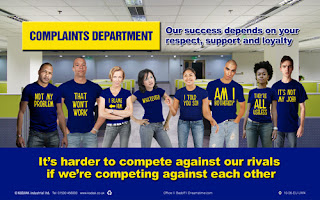 |
| 1 |
 |
| 2 |
 |
| 3 |
Every workplace is made up of different people who are put together based, primarily, on their ability to do a job. It is perhaps inevitable that they do not always see eye to eye and that there are disagreements and differences of opinion between them.
So why does conflict arise?
Poor communication is one of the key problems. It can arise when colleagues fail to pass on messages, deliver wrong messages or withhold vital information. As communication is a two-way process, it can also occur when colleagues fail to listen to each other.
Poor interpersonal skills mean that some people are less able to express themselves clearly or negotiate effectively. This can lead to frustration, which ultimately causes conflict.
Personality clashes arise when, for whatever reason, two people simply do not get on. Where there is an underlying tension, conflicts and disagreements can tend to happen more easily.
Divided interests. For example, if one person has the task of reducing costs and another is committed to quality there could be disputes over timing, materials or staff.
Lack of resources can cause stress and frustration. For example, not having enough equipment to go around, or having to make do with outdated or inefficient systems.
Low morale may leave some people feeling undervalued or taken for granted.
Most disputes are dealt with satisfactorily. However, unresolved conflict can be disastrous, resulting in staff developing bad attitudes, refusing to cooperate, not caring about quality and not contributing sufficiently to meet deadlines and targets.
How can we deal with conflict constructively?
Be open-minded. You might have the wrong end of the stick or be barking up the wrong tree. Wait until you have all the facts before you make your case.
Be respectful. Treat everyone as you would wish to be treated. Be calm, courteous and professional – do not raise your voice or use bad language.
Communicate effectively. Make your point assertively and rationally. Allow everyone else to voice their opinions and listen carefully to what they have to say.
Empathise. Try to put yourself in the other person's shoes and understand his/her point of view.
Focus on solutions. How do you want the situation to be resolved? Is there a solution that would suit everyone?
Be prepared to compromise. If there isn't an ideal solution to the problem, you may need to be more flexible.
Keep it professional. Focus on problems – not people – and put personal feelings aside.
Kodiak's workplace poster programme regularly deals with conflict at work and associated issues such as:
- Attitude
- Teamwork
- Assertiveness
- Morale
- Respect in the workplace
- Good communication
- Professional conduct
If you would like to find out more about how our posterscan help you address conflict and other issues in your workplace, please get in touch.

No comments:
Post a Comment